homepage news
Top 10 local stories of 2016
Trans women face violence; Election Night turns somber
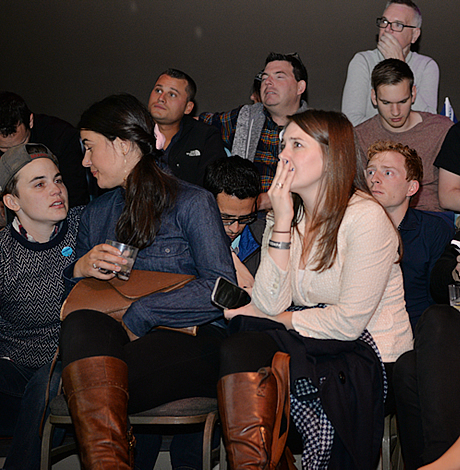
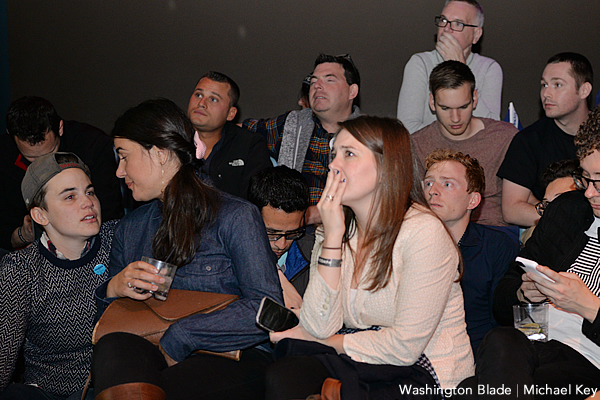
Hundreds of Hillary Clinton supporters filled Town on Hundreds of Hillary Clinton supporters filled Town on Election Night, only to leave shocked and disappointed. (Washington Blade photo by Michael Key)
These are the top 10 D.C.-area stories of 2016 as selected by the Blade’s editorial staff.
#10: D.C. submits bid to host 2022 Gay Games
Tennis legend Billie Jean King was among those who announced their support for D.C.’s bid to host the 2022 Gay Games, which a committee representing local LGBT sports groups officially submitted on Nov. 30.
The quadrennial LGBT international sports competition usually draws between 12,000 and 15,000 athletic competitors and between 80,000 and 100,000 spectators to the host city.
#9: African-American History Museum opens
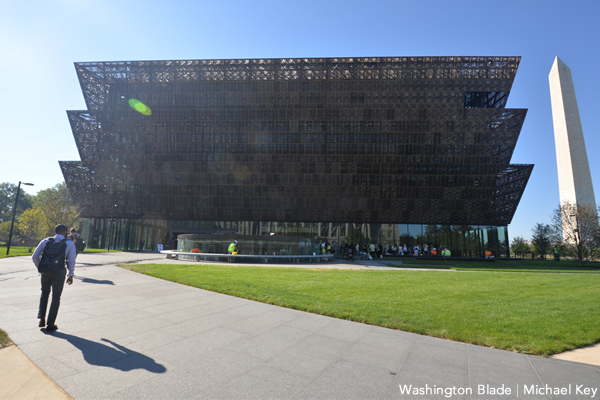
The National Museum of African American History and Culture opened on Sept. 24. (Washington Blade photo by Michael Key)
LGBT activists joined in the celebrations surrounding the grand opening on Sept. 24 of the National Museum of African American History and Culture, which is located on the National Mall across the street from the Washington Monument.
The new museum, which has drawn record crowds, includes several LGBT-related exhibits, including an inscribed watch that Martin Luther King Jr. gave to Bayard Rustin, a gay man who served as lead organizer of the 1963 March on Washington in which King gave his famous ‘I Have a Dream’ speech.
“It’s a very poignant reminder of the relationship between Martin Luther King and Bayard Rustin,” said William Pretzer, a supervisory museum curator of history associated with the African American Museum.
Pretzer said many of the museum’s exhibits show that the African American freedom movement inspired other groups, including LGBT rights advocates, to organize and agitate for their own liberation.
#8: ‘Furies House’ named historic landmark
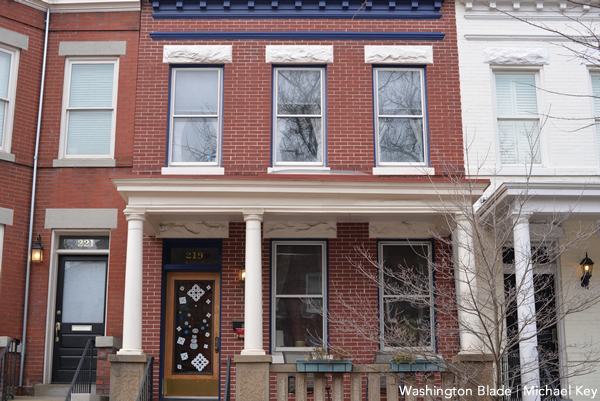
The National Park Service on May 4 honored the Furies House on Capitol Hill. (Washington Blade photo by Michael Key)
The National Park Service on May 4 added a Capitol Hill row house used in the early 1970s as headquarters for a lesbian feminist group called the Furies Collective to the National Register of Historic Places.
The action by the Park Service came four months after the D.C. Historic Preservation Review Board voted unanimously to designate the Furies House as a historic landmark on the D.C. Inventory of Historic Sites.
LGBT history advocate Mark Meinke, who filed a 63-page nominating petition for the house’s D.C. historic status, said its designation by D.C. and the National Park Service as a historic site and landmark marked the first time a specifically lesbian oriented site achieved such a status.
“The house at 219 11th Street, S.E., Washington, D.C. became the operational center of the lesbian feminist separatist collective, The Furies, between late 1971 and the autumn of 1973 which created and led the debate over lesbians’ place in society,” Meinke wrote in his nomination application.
#7: Police end midnight shift for LGBT Liaison Unit
D.C. police officials confirmed in January that they had discontinued the midnight shift for the department’s LGBT Liaison Unit a few months earlier as part of a redistribution of officers to “where the call volume is heaviest.”
Sources familiar with the LGBT unit said its midnight shift has often been the unit’s busiest time period because higher rates of violent crime and domestic violence occur during late-night hours.
The elimination of the midnight shift came about one year after members of the LGBT Liaison Unit and other police liaison units were assigned to unrelated patrol duties for half of their daily work shifts due to a shortage of officers on the force, police officials said.
The LGBT Liaison Unit has been “greatly diminished” in recent years, Stephania Mahdi, chair of the D.C. Anti-Violence Project, told a City Council hearing on police matters in March.
“The truth of the matter is the LGBT community does not feel the same level of support from the Liaison Unit that they have received in previous years,” she said.
#6: Trump campaign courts gay delegates in D.C.
A representative of Donald Trump’s presidential campaign in February called the president of Log Cabin Republicans of D.C. and four or five other members of the group to invite them to run as delegate candidates pledged to Trump.
D.C. Log Cabin President Chris Allen said the Trump campaign representative knew that he and several other D.C. Log Cabin members were running as uncommitted delegate candidates in the city’s March 12 Republican presidential preference convention.
“She just called to say that the Trump campaign noticed that I wasn’t affiliated with anyone and wanted to know if I would like his endorsement for delegate,” Allen told the Blade. “And I just told her I wasn’t looking for any endorsement at this time.”
Allen and the other Log Cabin delegate candidates, who also declined the Trump campaign’s offer of an endorsement, lost their races to become uncommitted delegates at the D.C. GOP convention. Most of the D.C. GOP candidates who won delegate positions were committed to then presidential candidate Marco Rubio and John Kasich.
#5: Chase Brexton roiled over union fight
Baltimore’s Chase Brexton Health Care, which operates health centers that serve the LGBT community in Maryland, became the target of community protests and criticism from more than a dozen LGBT advocacy organizations in August when its upper management aggressively opposed an effort by employees to form a union.
Union organizers and their supporters among Chase Brexton’s patients and local activists became outraged when top managers, reportedly with the approval of CEO Richard Larison, fired at least five managers in retaliation for their support for the unionizing effort. In November Chase Brexton’s Board announced that Larison decided not to renew his contract to continue as CEO and would be stepping down at the end of the year.
#4: Chef Tyonne Johns murdered
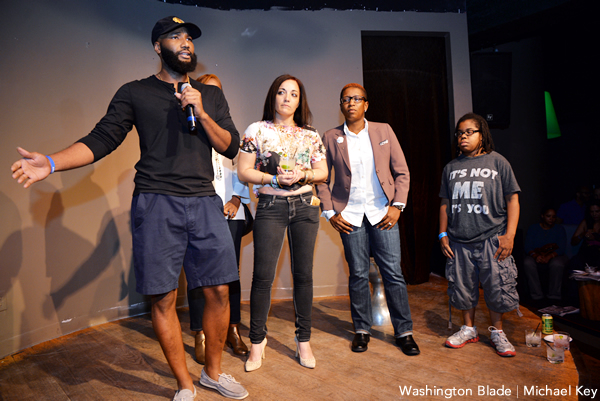
Lesbian chef and caterer Tyonne Johns was stabbed to death in August. She was later honored at the Blade’s Best Of awards at Town Danceboutique. (Washington Blade photo by Michael Key)
Lesbian chef and caterer Tyonne Johns, 35, a beloved figure in the D.C. area, was stabbed to death on Aug. 6 while coordinating the catering of an outdoor wedding at a park in Chantilly, Va.
A Fairfax County judge on Oct. 31 ruled that prosecutors established probable cause that 19-year-old Kempton Alexander Bonds, a summer employee at the park, allegedly fatally stabbed Johns during an argument over the ownership of folding chairs used for the wedding. Police charged Bonds with second-degree murder. He has been released on a $250,000 bond while awaiting trial.
Johns was a highly acclaimed chef who operated her own catering business in the D.C. area during the past several years. Readers of the Washington Blade in October voted to posthumously award Johns the honor of “Best Chef” in the Blade’s 2016 Best of Gay D.C. competition.
No. 3: One-third of LGB students considered suicide
Thirty-two percent of D.C. high school students who identify as gay, lesbian, or bisexual reported they “seriously considered attempting suicide” during the previous 12 months, according to the city school system’s annual Youth Risk Behavior Survey released on Sept. 1.
The survey findings show that the LGB students’ heterosexual peers reported seriously committing suicide during the same 12-month period at a rate of 10 percent.
D.C. Public Schools officials didn’t respond to an inquiry by the Blade about why transgender students have not been included in the annual survey since it began more than 10 years ago.
No. 2: Trans women murdered in D.C. area
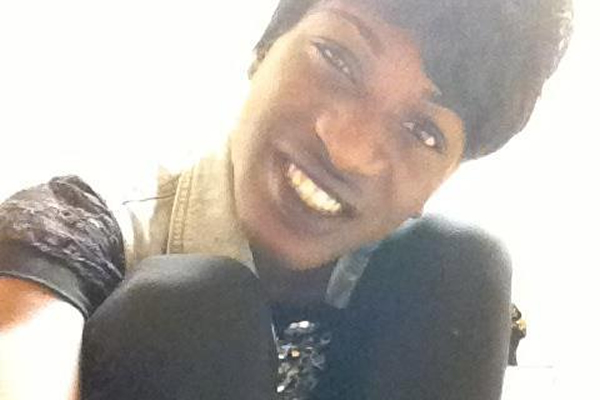
Deeniquia Dodds was shot to death on July 4. (Photo courtesy Facebook)
LGBT activists in D.C., Virginia and Maryland have expressed alarm that at least four transgender women lost their lives to violence in 2016 in separate incidents in D.C., Rockville, Baltimore and Richmond.
Each of the victims was a transgender woman of color, which anti-violence activists say is in keeping with a longstanding national trend showing trans women of color are at high risk for violent attacks and murder.
Authorities have identified the victims as Keyonna Blackeny, 22, who was found stabbed to death on April 16 in a room she had booked at the Red Roof Inn in Rockville, Md.; Deeniquia Dodds, 22, who was fatally shot in the early morning hours of July 4 near her home on Division Ave, N.E., in D.C.; Crystal Edmonds, 32, who was fatally shot Sept. 16 on a street in Baltimore; and Noony Norwood, 30, a Richmond resident who was found suffering from fatal gunshot wounds on a street in South Richmond on Nov. 6.
Two men have been arrested and charged with first-degree murder in the Blackeny case at the Red Roof Inn and another two men have been charged with first-degree murder in the Dodds case in D.C. D.C. police have said the motive in the Dodds murder was robbery but the two suspects appear to have targeted Dodds because she was transgender.
#1: LGBT allies win most races in D.C. area
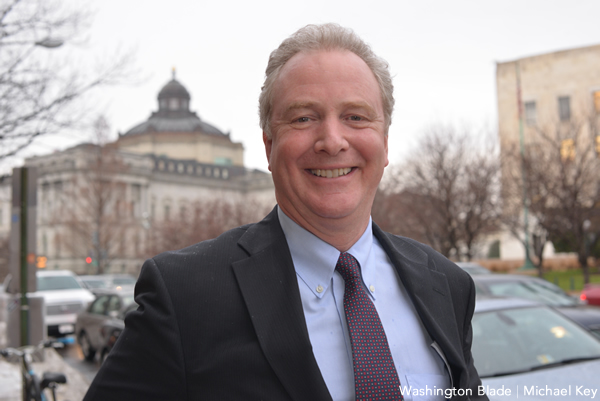
U.S. Rep. Chris Van Hollen (D-Md.) will succeed U.S. Sen. Barbara Mikulski (D-Md.) in the U.S. Senate. (Washington Blade photo by Michael Key)
Nine of 10 LGBT allies, including former D.C. Mayor Vincent Gray, won their races for seats on the City Council and the D.C. State Board of Education in the Nov. 8 election. Among those winning their races was D.C. State Board of Education President Jack Jacobson, the city’s highest-ranking openly gay elected official.
In key races in Maryland, Rep. Chris Van Hollen (D-Md.), a longtime supporter of LGBT rights, won election to the U.S. Senate seat being vacated by retiring Sen. Barbara Mikulski (D), who also has been a longtime LGBT rights backer.
Another longtime LGBT ally who won on Nov. 8 was Maryland State Sen. Jamie Raskin (D-Montgomery County), who beat GOP challenger Dan Cox for the U.S. House seat being vacated by Van Hollen. Former Maryland Lt. Gov. Anthony Brown, yet another LGBT ally, won election to the state’s 4th Congressional District, which includes parts of Prince George’s County.
In Virginia, LGBT supporter Rep. Don Beyer (D-Va.) won re-election to his Northern Virginia U.S. House seat. But Democratic challenger and LGBT rights supporter LuAnn Bennett lost her race against incumbent Rep. Barbara Comstock (R-Va.) in the state’s 10th Congressional District, also in Northern Virginia. Comstock has had a mixed record on LGBT issues during her tenure as a member of the Virginia House of Delegates.
While pleased with the electoral success of local and state allies, LGBT activists grew increasingly somber at an election night party at D.C.’s Town nightclub as election returns projected on large video monitors showed Republican presidential nominee Donald Trump defeating Democrat Hillary Clinton.
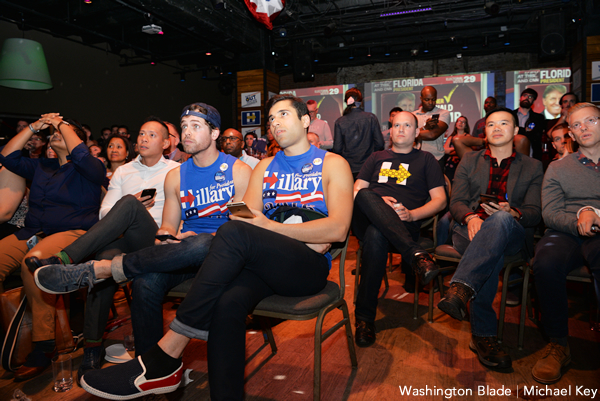
Hillary Clinton supporters attended an election watch party at Town. (Washington Blade photo by Michael Key)
homepage news
Honoring the legacy of New Orleans’ 1973 UpStairs Lounge fire
Why the arson attack that killed 32 gay men still resonates 50 years later

On June 23 of last year, I held the microphone as a gay man in the New Orleans City Council Chamber and related a lost piece of queer history to the seven council members. I told this story to disabuse all New Orleanians of the notion that silence and accommodation, in the face of institutional and official failures, are a path to healing.
The story I related to them began on a typical Sunday night at a second-story bar on the fringe of New Orleans’ French Quarter in 1973, where working-class men would gather around a white baby grand piano and belt out the lyrics to a song that was the anthem of their hidden community, “United We Stand” by the Brotherhood of Man.
“United we stand,” the men would sing together, “divided we fall” — the words epitomizing the ethos of their beloved UpStairs Lounge bar, an egalitarian free space that served as a forerunner to today’s queer safe havens.
Around that piano in the 1970s Deep South, gays and lesbians, white and Black queens, Christians and non-Christians, and even early gender minorities could cast aside the racism, sexism, and homophobia of the times to find acceptance and companionship for a moment.
For regulars, the UpStairs Lounge was a miracle, a small pocket of acceptance in a broader world where their very identities were illegal.
On the Sunday night of June 24, 1973, their voices were silenced in a murderous act of arson that claimed 32 lives and still stands as the deadliest fire in New Orleans history — and the worst mass killing of gays in 20th century America.
As 13 fire companies struggled to douse the inferno, police refused to question the chief suspect, even though gay witnesses identified and brought the soot-covered man to officers idly standing by. This suspect, an internally conflicted gay-for-pay sex worker named Rodger Dale Nunez, had been ejected from the UpStairs Lounge screaming the word “burn” minutes before, but New Orleans police rebuffed the testimony of fire survivors on the street and allowed Nunez to disappear.
As the fire raged, police denigrated the deceased to reporters on the street: “Some thieves hung out there, and you know this was a queer bar.”
For days afterward, the carnage met with official silence. With no local gay political leaders willing to step forward, national Gay Liberation-era figures like Rev. Troy Perry of the Metropolitan Community Church flew in to “help our bereaved brothers and sisters” — and shatter officialdom’s code of silence.
Perry broke local taboos by holding a press conference as an openly gay man. “It’s high time that you people, in New Orleans, Louisiana, got the message and joined the rest of the Union,” Perry said.
Two days later, on June 26, 1973, as families hesitated to step forward to identify their kin in the morgue, UpStairs Lounge owner Phil Esteve stood in his badly charred bar, the air still foul with death. He rebuffed attempts by Perry to turn the fire into a call for visibility and progress for homosexuals.
“This fire had very little to do with the gay movement or with anything gay,” Esteve told a reporter from The Philadelphia Inquirer. “I do not want my bar or this tragedy to be used to further any of their causes.”
Conspicuously, no photos of Esteve appeared in coverage of the UpStairs Lounge fire or its aftermath — and the bar owner also remained silent as he witnessed police looting the ashes of his business.
“Phil said the cash register, juke box, cigarette machine and some wallets had money removed,” recounted Esteve’s friend Bob McAnear, a former U.S. Customs officer. “Phil wouldn’t report it because, if he did, police would never allow him to operate a bar in New Orleans again.”
The next day, gay bar owners, incensed at declining gay bar traffic amid an atmosphere of anxiety, confronted Perry at a clandestine meeting. “How dare you hold your damn news conferences!” one business owner shouted.
Ignoring calls for gay self-censorship, Perry held a 250-person memorial for the fire victims the following Sunday, July 1, culminating in mourners defiantly marching out the front door of a French Quarter church into waiting news cameras. “Reverend Troy Perry awoke several sleeping giants, me being one of them,” recalled Charlene Schneider, a lesbian activist who walked out of that front door with Perry.

Esteve doubted the UpStairs Lounge story’s capacity to rouse gay political fervor. As the coroner buried four of his former patrons anonymously on the edge of town, Esteve quietly collected at least $25,000 in fire insurance proceeds. Less than a year later, he used the money to open another gay bar called the Post Office, where patrons of the UpStairs Lounge — some with visible burn scars — gathered but were discouraged from singing “United We Stand.”
New Orleans cops neglected to question the chief arson suspect and closed the investigation without answers in late August 1973. Gay elites in the city’s power structure began gaslighting the mourners who marched with Perry into the news cameras, casting suspicion on their memories and re-characterizing their moment of liberation as a stunt.
When a local gay journalist asked in April 1977, “Where are the gay activists in New Orleans?,” Esteve responded that there were none, because none were needed. “We don’t feel we’re discriminated against,” Esteve said. “New Orleans gays are different from gays anywhere else… Perhaps there is some correlation between the amount of gay activism in other cities and the degree of police harassment.”

An attitude of nihilism and disavowal descended upon the memory of the UpStairs Lounge victims, goaded by Esteve and fellow gay entrepreneurs who earned their keep via gay patrons drowning their sorrows each night instead of protesting the injustices that kept them drinking.
Into the 1980s, the story of the UpStairs Lounge all but vanished from conversation — with the exception of a few sanctuaries for gay political debate such as the local lesbian bar Charlene’s, run by the activist Charlene Schneider.
By 1988, the 15th anniversary of the fire, the UpStairs Lounge narrative comprised little more than a call for better fire codes and indoor sprinklers. UpStairs Lounge survivor Stewart Butler summed it up: “A tragedy that, as far as I know, no good came of.”
Finally, in 1991, at Stewart Butler and Charlene Schneider’s nudging, the UpStairs Lounge story became aligned with the crusade of liberated gays and lesbians seeking equal rights in Louisiana. The halls of power responded with intermittent progress. The New Orleans City Council, horrified by the story but not yet ready to take its look in the mirror, enacted an anti-discrimination ordinance protecting gays and lesbians in housing, employment, and public accommodations that Dec. 12 — more than 18 years after the fire.
“I believe the fire was the catalyst for the anger to bring us all to the table,” Schneider told The Times-Picayune, a tacit rebuke to Esteve’s strategy of silent accommodation. Even Esteve seemed to change his stance with time, granting a full interview with the first UpStairs Lounge scholar Johnny Townsend sometime around 1989.
Most of the figures in this historic tale are now deceased. What’s left is an enduring story that refused to go gently. The story now echoes around the world — a musical about the UpStairs Lounge fire recently played in Tokyo, translating the gay underworld of the 1973 French Quarter for Japanese audiences.
When I finished my presentation to the City Council last June, I looked up to see the seven council members in tears. Unanimously, they approved a resolution acknowledging the historic failures of city leaders in the wake of the UpStairs Lounge fire.
Council members personally apologized to UpStairs Lounge families and survivors seated in the chamber in a symbolic act that, though it could not bring back those who died, still mattered greatly to those whose pain had been denied, leaving them to grieve alone. At long last, official silence and indifference gave way to heartfelt words of healing.
The way Americans remember the past is an active, ongoing process. Our collective memory is malleable, but it matters because it speaks volumes about our maturity as a people, how we acknowledge the past’s influence in our lives, and how it shapes the examples we set for our youth. Do we grapple with difficult truths, or do we duck accountability by defaulting to nostalgia and bluster? Or worse, do we simply ignore the past until it fades into a black hole of ignorance and indifference?
I believe that a factual retelling of the UpStairs Lounge tragedy — and how, 50 years onward, it became known internationally — resonates beyond our current divides. It reminds queer and non-queer Americans that ignoring the past holds back the present, and that silence is no cure for what ails a participatory nation.
Silence isolates. Silence gaslights and shrouds. It preserves the power structures that scapegoat the disempowered.
Solidarity, on the other hand, unites. Solidarity illuminates a path forward together. Above all, solidarity transforms the downtrodden into a resounding chorus of citizens — in the spirit of voices who once gathered ‘round a white baby grand piano and sang, joyfully and loudly, “United We Stand.”

Robert W. Fieseler is a New Orleans-based journalist and the author of “Tinderbox: the Untold Story of the Up Stairs Lounge Fire and the Rise of Gay Liberation.”
homepage news
New Supreme Court term includes critical LGBTQ case with ‘terrifying’ consequences
Business owner seeks to decline services for same-sex weddings

The U.S. Supreme Court, after a decision overturning Roe v. Wade that still leaves many reeling, is starting a new term with justices slated to revisit the issue of LGBTQ rights.
In 303 Creative v. Elenis, the court will return to the issue of whether or not providers of custom-made goods can refuse service to LGBTQ customers on First Amendment grounds. In this case, the business owner is Lorie Smith, a website designer in Colorado who wants to opt out of providing her graphic design services for same-sex weddings despite the civil rights law in her state.
Jennifer Pizer, acting chief legal officer of Lambda Legal, said in an interview with the Blade, “it’s not too much to say an immeasurably huge amount is at stake” for LGBTQ people depending on the outcome of the case.
“This contrived idea that making custom goods, or offering a custom service, somehow tacitly conveys an endorsement of the person — if that were to be accepted, that would be a profound change in the law,” Pizer said. “And the stakes are very high because there are no practical, obvious, principled ways to limit that kind of an exception, and if the law isn’t clear in this regard, then the people who are at risk of experiencing discrimination have no security, no effective protection by having a non-discrimination laws, because at any moment, as one makes their way through the commercial marketplace, you don’t know whether a particular business person is going to refuse to serve you.”
The upcoming arguments and decision in the 303 Creative case mark a return to LGBTQ rights for the Supreme Court, which had no lawsuit to directly address the issue in its previous term, although many argued the Dobbs decision put LGBTQ rights in peril and threatened access to abortion for LGBTQ people.
And yet, the 303 Creative case is similar to other cases the Supreme Court has previously heard on the providers of services seeking the right to deny services based on First Amendment grounds, such as Masterpiece Cakeshop and Fulton v. City of Philadelphia. In both of those cases, however, the court issued narrow rulings on the facts of litigation, declining to issue sweeping rulings either upholding non-discrimination principles or First Amendment exemptions.
Pizer, who signed one of the friend-of-the-court briefs in opposition to 303 Creative, said the case is “similar in the goals” of the Masterpiece Cakeshop litigation on the basis they both seek exemptions to the same non-discrimination law that governs their business, the Colorado Anti-Discrimination Act, or CADA, and seek “to further the social and political argument that they should be free to refuse same-sex couples or LGBTQ people in particular.”
“So there’s the legal goal, and it connects to the social and political goals and in that sense, it’s the same as Masterpiece,” Pizer said. “And so there are multiple problems with it again, as a legal matter, but also as a social matter, because as with the religion argument, it flows from the idea that having something to do with us is endorsing us.”
One difference: the Masterpiece Cakeshop litigation stemmed from an act of refusal of service after owner, Jack Phillips, declined to make a custom-made wedding cake for a same-sex couple for their upcoming wedding. No act of discrimination in the past, however, is present in the 303 Creative case. The owner seeks to put on her website a disclaimer she won’t provide services for same-sex weddings, signaling an intent to discriminate against same-sex couples rather than having done so.
As such, expect issues of standing — whether or not either party is personally aggrieved and able bring to a lawsuit — to be hashed out in arguments as well as whether the litigation is ripe for review as justices consider the case. It’s not hard to see U.S. Chief Justice John Roberts, who has sought to lead the court to reach less sweeping decisions (sometimes successfully, and sometimes in the Dobbs case not successfully) to push for a decision along these lines.
Another key difference: The 303 Creative case hinges on the argument of freedom of speech as opposed to the two-fold argument of freedom of speech and freedom of religious exercise in the Masterpiece Cakeshop litigation. Although 303 Creative requested in its petition to the Supreme Court review of both issues of speech and religion, justices elected only to take up the issue of free speech in granting a writ of certiorari (or agreement to take up a case). Justices also declined to accept another question in the petition request of review of the 1990 precedent in Smith v. Employment Division, which concluded states can enforce neutral generally applicable laws on citizens with religious objections without violating the First Amendment.
Representing 303 Creative in the lawsuit is Alliance Defending Freedom, a law firm that has sought to undermine civil rights laws for LGBTQ people with litigation seeking exemptions based on the First Amendment, such as the Masterpiece Cakeshop case.
Kristen Waggoner, president of Alliance Defending Freedom, wrote in a Sept. 12 legal brief signed by her and other attorneys that a decision in favor of 303 Creative boils down to a clear-cut violation of the First Amendment.
“Colorado and the United States still contend that CADA only regulates sales transactions,” the brief says. “But their cases do not apply because they involve non-expressive activities: selling BBQ, firing employees, restricting school attendance, limiting club memberships, and providing room access. Colorado’s own cases agree that the government may not use public-accommodation laws to affect a commercial actor’s speech.”
Pizer, however, pushed back strongly on the idea a decision in favor of 303 Creative would be as focused as Alliance Defending Freedom purports it would be, arguing it could open the door to widespread discrimination against LGBTQ people.
“One way to put it is art tends to be in the eye of the beholder,” Pizer said. “Is something of a craft, or is it art? I feel like I’m channeling Lily Tomlin. Remember ‘soup and art’? We have had an understanding that whether something is beautiful or not is not the determining factor about whether something is protected as artistic expression. There’s a legal test that recognizes if this is speech, whose speech is it, whose message is it? Would anyone who was hearing the speech or seeing the message understand it to be the message of the customer or of the merchants or craftsmen or business person?”
Despite the implications in the case for LGBTQ rights, 303 Creative may have supporters among LGBTQ people who consider themselves proponents of free speech.
One joint friend-of-the-court brief before the Supreme Court, written by Dale Carpenter, a law professor at Southern Methodist University who’s written in favor of LGBTQ rights, and Eugene Volokh, a First Amendment legal scholar at the University of California, Los Angeles, argues the case is an opportunity to affirm the First Amendment applies to goods and services that are uniquely expressive.
“Distinguishing expressive from non-expressive products in some contexts might be hard, but the Tenth Circuit agreed that Smith’s product does not present a hard case,” the brief says. “Yet that court (and Colorado) declined to recognize any exemption for products constituting speech. The Tenth Circuit has effectively recognized a state interest in subjecting the creation of speech itself to antidiscrimination laws.”
Oral arguments in the case aren’t yet set, but may be announced soon. Set to defend the state of Colorado and enforcement of its non-discrimination law in the case is Colorado Solicitor General Eric Reuel Olson. Just this week, the U.S. Supreme Court announced it would grant the request to the U.S. solicitor general to present arguments before the justices on behalf of the Biden administration.
With a 6-3 conservative majority on the court that has recently scrapped the super-precedent guaranteeing the right to abortion, supporters of LGBTQ rights may think the outcome of the case is all but lost, especially amid widespread fears same-sex marriage would be next on the chopping block. After the U.S. Tenth Circuit Court of Appeals ruled against 303 Creative in the lawsuit, the simple action by the Supreme Court to grant review in the lawsuit suggests they are primed to issue a reversal and rule in favor of the company.
Pizer, acknowledging the call to action issued by LGBTQ groups in the aftermath of the Dobbs decision, conceded the current Supreme Court issuing the ruling in this case is “a terrifying prospect,” but cautioned the issue isn’t so much the makeup of the court but whether or not justices will continue down the path of abolishing case law.
“I think the question that we’re facing with respect to all of the cases or at least many of the cases that are in front of the court right now, is whether this court is going to continue on this radical sort of wrecking ball to the edifice of settled law and seemingly a goal of setting up whole new structures of what our basic legal principles are going to be. Are we going to have another term of that?” Pizer said. “And if so, that’s terrifying.”
homepage news
Kelley Robinson, a Black, queer woman, named president of Human Rights Campaign
Progressive activist a veteran of Planned Parenthood Action Fund

Kelley Robinson, a Black, queer woman and veteran of Planned Parenthood Action Fund, is to become the next president of the Human Rights Campaign, the nation’s leading LGBTQ group announced on Tuesday.
Robinson is set to become the ninth president of the Human Rights Campaign after having served as executive director of Planned Parenthood Action Fund and more than 12 years of experience as a leader in the progressive movement. She’ll be the first Black, queer woman to serve in that role.
“I’m honored and ready to lead HRC — and our more than three million member-advocates — as we continue working to achieve equality and liberation for all Lesbian, Gay, Bisexual, Transgender, and Queer people,” Robinson said. “This is a pivotal moment in our movement for equality for LGBTQ+ people. We, particularly our trans and BIPOC communities, are quite literally in the fight for our lives and facing unprecedented threats that seek to destroy us.”
The next Human Rights Campaign president is named as Democrats are performing well in polls in the mid-term elections after the U.S. Supreme Court overturned Roe v. Wade, leaving an opening for the LGBTQ group to play a key role amid fears LGBTQ rights are next on the chopping block.
“The overturning of Roe v. Wade reminds us we are just one Supreme Court decision away from losing fundamental freedoms including the freedom to marry, voting rights, and privacy,” Robinson said. “We are facing a generational opportunity to rise to these challenges and create real, sustainable change. I believe that working together this change is possible right now. This next chapter of the Human Rights Campaign is about getting to freedom and liberation without any exceptions — and today I am making a promise and commitment to carry this work forward.”
The Human Rights Campaign announces its next president after a nearly year-long search process after the board of directors terminated its former president Alphonso David when he was ensnared in the sexual misconduct scandal that led former New York Gov. Andrew Cuomo to resign. David has denied wrongdoing and filed a lawsuit against the LGBTQ group alleging racial discrimination.

-

 State Department2 days ago
State Department2 days agoState Department releases annual human rights report
-

 Maryland4 days ago
Maryland4 days agoJoe Vogel campaign holds ‘Big Gay Canvass Kickoff’
-

 Politics3 days ago
Politics3 days agoSmithsonian staff concerned about future of LGBTQ programming amid GOP scrutiny
-

 The White House1 day ago
The White House1 day agoWhite House debuts action plan targeting pollutants in drinking water











